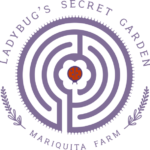Great Balls of Fire
Julia was away with Graydon to visit Great Grandma Marie, leaving me at home with Lena. It was a Sunday— a clear, bright, winter day with the farm shut down and no chores to take care of— and I thought it would be fun if she and I had a little picnic. We wouldn’t need to go anywhere, except to the store for some chips, soda-pop and hotdogs, because we have a canyon on our property with redwood trees, and at the bottom of the gulch there’s a perfect little spot.
Lena and I went to the market in nearby Corralitos, and then I gathered up some tools. I brought loppers to cut any twigs of poison oak away from the trail, and a pair of pruning shears so that Lena could clip any brush away from the picnic site. I also brought a rake, a mattock, and a shovel, so that I could dig a fire pit, and sweep the area free from sticks and leaves. Lena hauled the picnic goodies, and I hauled the tools. In five minutes we were at the bottom of the canyon and in the middle of the fairy ring.
 The blackened remains of the stump of the original mother redwood tree were still in the middle of the ring. That’s the pattern—the original redwood tree is cut down or burns down, then new saplings shoot up in a ring from the roots of the stump. Redwoods do not always sprout readily from seeds. Since any redwood groves that are accessible have usually been logged at least once, almost all the large redwood trees we ever see are re-growth, and many are often found growing in some semblance of a ring. This vegetative form of self-propagation was true in the redwood groves even before settlers started to chop down the old-growth forests.
The blackened remains of the stump of the original mother redwood tree were still in the middle of the ring. That’s the pattern—the original redwood tree is cut down or burns down, then new saplings shoot up in a ring from the roots of the stump. Redwoods do not always sprout readily from seeds. Since any redwood groves that are accessible have usually been logged at least once, almost all the large redwood trees we ever see are re-growth, and many are often found growing in some semblance of a ring. This vegetative form of self-propagation was true in the redwood groves even before settlers started to chop down the old-growth forests.
The first redwood trees that the Spaniards encountered during Portola’s expedition in 1769 were growing near the site of our home ranch in the Pajaro Valley. These ancient redwood trees measured thirteen feet in diameter and were the largest, tallest, straightest trees the Spaniards had ever seen. Portola’s men encountered old-growth fairy rings grown out around once fallen, now decomposed Redwood giants, and in those places the rings of massive redwood trunks seemed to surround the central clearing like palisades. The Spanish soldiers needed to rest, so they pastured their horses in the middle of these fairy rings and called the area “Corralitos,” which means “little corrals.”
I dug a pit in the thick duff of fallen redwood leaves. There hadn’t been any rain for weeks, but the soil was damp. We swept an area clean and built a small fire. Lena and I fed the fire with the sticks that she gathered from around the area, and when there were coals in the fire pit I cooked the hotdogs in a little cast iron skillet. We enjoyed the hotdogs, which we never have if Julia is around (All-beef, from the Corralitos Market. They also make great sausages in-house.) We crunched our chips, (also normally verboten junk food) and we swigged our soda drinks (suspect, but allowed under party circumstances).
 When our meal was over, Lena and I lay on our backs and gazed up into the redwoods. The canyon is so deep and the redwoods tower so high, that being inside the fairy ring is like visiting a primeval world. I told Lena about how her great-grandma, Anna, and her great grandpa, Graydon, got married underneath these redwood trees in 1918. Anna and Graydon were poor and couldn’t afford a church wedding. Besides, picking the right church was difficult since they were from different religions— Anna being a Lutheran, and Graydon a Baptist!
When our meal was over, Lena and I lay on our backs and gazed up into the redwoods. The canyon is so deep and the redwoods tower so high, that being inside the fairy ring is like visiting a primeval world. I told Lena about how her great-grandma, Anna, and her great grandpa, Graydon, got married underneath these redwood trees in 1918. Anna and Graydon were poor and couldn’t afford a church wedding. Besides, picking the right church was difficult since they were from different religions— Anna being a Lutheran, and Graydon a Baptist!
“Don’t you think we should stretch a hose down from the house to put out the campfire?” Lena asked when we were getting ready to go.
“Nah,” I replied. “The soil is wet, and besides, I’m going to put out the coals with shovelfuls of dirt.”
I sent her home, and I stayed to extinguish the coals. I heaped dirt into the fire pit until there was no smoke and then stayed for a while by myself, thinking. The last time the redwoods on our property were cut down was in 1907 when the rebuilding of San Francisco after the earthquake and fire of 1906 made for a hot lumber market. But my grandparents weren’t married under saplings, so maybe these trees are re-growth from the first timber harvest of 1868. That would account for their great size.
Then again, these redwoods could even have been cut down the first time even earlier. In 1827 this land was part of the original Rancho Corralitos, granted to Don José Amesti, a Spaniard Basque, by Mexican Emperor Iturbide. Don Amesti built a saw mill in the 1830s and leased parts of his ranch to timber harvesters, so these trees could have been cut down for the first time even earlier.
I read that Don Amesti had three daughters, and one of them was nick-named “Mariquita,” or “ladybug.” When the Americans came, many of the Mexican rancheros were unable to defend their land patents in court because they couldn’t produce the original paperwork signed by the Spanish or Mexican authorities. Maybe the deeds had been destroyed in fires or lost through accident, or by negligence. Sometimes the rancheros “fell off their horses” and broke their necks on their way to their hearings, and the relevant documents blew away like pieces of garbage. Apparently the Amesti heirs were able to successfully defend their claims to the land twice.
The next day, around one in the afternoon, I was padding around in the kitchen in my rubber chef’s clogs, helping Lena with her homework. She’d discovered the old slate that my grandmother used for her school work back in 1905, and wanted to do her homework on it. I reminded her that it was a family heirloom, and that she should treat it with care. Then Manny came running to the kitchen window and pointed. Looking up I could see a great plume of smoke rising beyond the field. The donkeys and goats were bolting for the high ground— they’re not stupid. I tore out of the house.
The fire in the canyon was spreading quickly. Flames licked up through the dried leaves of the brush and wrapped around tree trunks. The hill is so steep that the rising heat was igniting leaves on the ground well ahead of the flames. The smoke was thick.
“Should I connect some hoses and get some water down here?” yelled out Manny over the flames.
“No,” I yelled back. “There’s no time. We have to stop the flames before they get to the eucalyptus.”
Indeed, up the hill is a grove of eucalyptus that my great grandfather planted in the ‘20s. The native redwood trees have evolved within the challenges of fire ecology; their bark burns slowly, the damp needles smolder. But the eucalyptus trees that were introduced from Australia burn like gasoline, and they carpet the forest floor with flammable leaves and bark. I ran uphill through the flames and started to cut a fire line with the mattock. The smoke was searing. It would’ve been smarter to dial 911 on the cell phone. Sometimes singed pride hurts worse than charred flesh.
Manny, his brother, Miguel, and I flailed at the flames like demons. In twenty minutes we stopped the advance of the flames, so we went back to beat out isolated hot spots. I was ripping on adrenalin, but reason began to assert itself. Obviously I had not put the fire out after the picnic with Lena. It must have burned underground all night. Much of what had been burning was poison oak brush, and I’d inhaled a lot of smoke. It dawned on me that my rubber clogs were no protection against coals and could even melt onto my feet.
I sent Manny to string some hoses together and bring water. Miguel kept working on the fire line, since this fire was still burning underground where we couldn’t see it. I threw dirt on glowing logs. Eventually Manny showed up with a garden hose. It had taken him a while to find and connect the dozen or so loose hose we had scattered around the property. With his thumb, he tried to guide the flow at a flame. The hose pissed out a tepid stream of water. I grabbed the hose. I couldn’t increase the pressure, but because I’m the tallest person on the farm, I was the one to try and spray down the little blazes that were still going up high in the crotches of trees.
I had a hold of the hose when the loose duff beneath my feet gave way and I went skidding down the hill on my butt through the smoking leaves and coals. The eucalyptus trees up the hill had rained down hard little, oily nuts for years, which had been baking in the fire, and which now began rolling inside my pants and catching in the crotch. Great Balls of Fire! It was exciting! Even though the afternoon had been no laughing matter, Miguel had to grin when he saw me stuff the hose down my pants and hold it there until the water ran out my pants leg.
I’d been gone from the house for a couple of hours now, and Lena was worried. The flames had died down and the smoke had dissipated when I looked up and saw Lena stepping gingerly down the trail into the forest up the slope from me.
“Get out of here, Lena” I yelled. “It’s still dangerous.”
Even as I yelled a slight breath of breeze caused the black cinders on a charred trunk of eucalyptus to glow with new life. There were pits in the ground where rotten logs had burned to ashes and left a nest of coals. But Lena doesn’t scare easily.
“Was I right, Papa?” she called out.
“Go home, Lena. You could get burned!”
“But was I right, Papa?” she repeated.
I’ll never live this one down.
“Yes Lena. You were right Now, go!”
So Lena turned and made her way back up the hill, happy that her papa was all right.
The Indians used to burn these woods in the winter to keep the country side open for acorn gathering and game hunting. If I’d planned the fire, gotten a permit and taken precautions, burning the canyon would have been a wise move. As it is, I remember my grandmother saying, “God has mercy on idiots and children.” I’m no child. At least I’m alive. But maybe Julia is right when she says hot dogs are no good for my health.
Copyright 2009 Andy Griffin
Photos taken by Andy today, March 17th, 2009:
#1) Lena at the gate to the fairy ring, two years after this story takes place.
Lena at the gate to the fairy ring, two years after this story takes place.
#2  Lena standing by one of the very few old growth trees left in the canyon by the earliest loggers.
Lena standing by one of the very few old growth trees left in the canyon by the earliest loggers.
Vegetable Recipes A – Z
0 thoughts on “Great Balls of Fire”
Leave a Reply
You must be logged in to post a comment.



ya know, your stuff always makes me smile, and I always learn stuff. but…
great balls of fire!
literally!
*biggrin*
This sounds like it was very hectic. I’m glad everyone is A-OK.